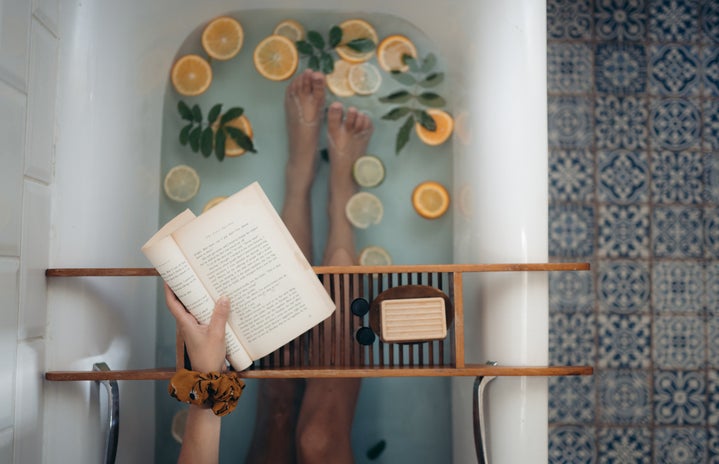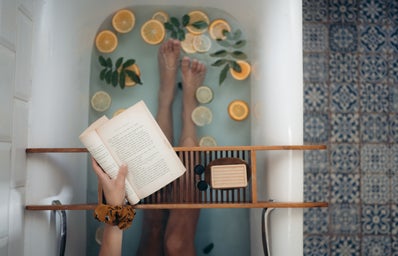Over the past year, our relationships with different parts of our lives have drastically changed due to the pandemic. When your bedroom is also acting as your classroom, workspace, and a place to virtually meet with your friends, it begins to feel like there’s no room for it to be your own. When all of these responsibilities are invading your personal space, it also feels like you owe them all of your time.
Personally, during the pandemic I’ve felt guiltier than ever for relaxing or taking time to myself, because there always seems to be work to do or a meeting to attend. I’ve noticed that whenever I’m spending time on myself, it feels like I’m not being “productive,” which was never a concern in my life prior to the pandemic. I’ve been holding myself to unfair and unrealistic standards—before the pandemic, I used to take time for myself, and that necessary practice didn’t make me to feel irresponsible, because the separations between school, work, and my personal life were much clearer.
In fact, it’s now more important to prioritize yourself, your needs, and your well–being than ever before! Using your limited time to take care of yourself can create feelings of guilt, but I’ve discovered that being intentional with your “me time” can often make those feelings disappear—and may even provide a sense of accomplishment. I’ve really enjoyed implementing intentional self-care in my life, because it provides a way for me to feel productive without every aspect of my life revolving around work or school.
One way I’ve altered my personal self–care routine is by limiting my phone time, since so much of my professional and social life already has to take place virtually. I also find that being preoccupied with technology can lead to us feeling drained rather than relaxed, which is one of the reasons I’ve found alternative ways to take breaks from my work. This allows me to truly spend time with myself and devote my energy to concrete interests, rather than scrolling on my phone for hours. It’s been extremely rewarding to discover new self–care activities, and I wanted to share a list of the ones that have helped me most this year.
- Journaling
-
Journaling is a great form of self–care, because it provides an outlet for any mental or emotional burdens. However, journaling doesn’t always have to mean keeping a diary—it’s a much more multifunctional practice than it may appear! There are many “unconventional” forms of journaling for those who don’t enjoy writing. For example, you can keep a gratitude journal, which serves as a reminder of all of the positives in your life, even during a time when everything may feel dark.
There are also many types of creative journals if you want a more artistic outlet. I especially love bullet journaling and collage journaling! Bullet journaling gives you the opportunity to create a planner that specifically fits your needs, and I really enjoy creating monthly spreads to keep track of my favorite movies, shows, or interests. They’re really fun to look back on at the end of the year! Collage journaling can be seen as more “arts and crafts” than traditional journaling, but it can be incredibly rewarding to print or cut pictures from magazines or websites that inspire you.
- Mindfulness and Meditation
-
As important as it is to be intentional about the time you spend on yourself, it’s equally as important to be intentional about your thoughts and thinking patterns throughout the day. In the age of the pandemic, negative thoughts, doubts, and anxieties are to be expected; however, despite the unstable state of the world at large, we have to remember that our individual lives are just as important to maintain. Even when it’s difficult, try to be kind to yourself. Though this time may feel very isolating, keep in mind that we’re all experiencing this together.
I’ve been learning to practice mindfulness and letting my thoughts exist without acting on them or allowing them to control my mindset. I find it much easier to adopt mindfulness when I’m intentionally setting time aside to meditate and focus on how I interact with my thoughts. I understand that it can be difficult to meditate on your own, so, if you’re like me, try some guided meditations.
- Putting Time Aside for Hobbies
-
As I said before, I began to feel guilty for being “unproductive” in my own home, but this was largely due to the fact that I would mindlessly scroll on my phone whenever I was free. I realized that if I added up all of the small amounts of time I spent on my phone, I could instead implement more “productive” activities into my life. This allowed me to set aside a few hours each week for the things that make me feel happy and fulfilled.
Since I’m not always the biggest fan of set schedules and routines, I love that this leaves me with countless options to fill my time. For example, I love channeling my energy into embroidery, baking, or learning about a new interest (recently, it’s been astrology!) Others may prefer to work out, read recreationally, use face masks, or go for bike rides.
These are just a few of the ways I’ve been implementing new self–care activities in my routine. Though they may not be for everyone, I highly recommend trying them to see what works best for you. The best part about self–care is that it’s a journey that allows you to create a stronger relationship with yourself, learn to care for your own needs, and spend time doing the things that truly make you happy. I hope you feel inspired to be more intentional about the time you spend with yourself and learn what activities make you feel most fulfilled!


